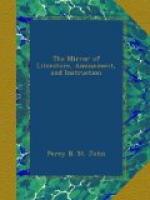He paints them, it is true, in their natural language, but the language is subservient to the character; he does not bow the man to the phrase, but the phrase to the man. Neither does he flatter on the one hand, as he does not slight on the other. Unlike the maudlin pastoralists of France he contents himself with the simple truth—he contrasts the dark shadows of Meg Merrilies, or of Edie Ochiltree, with the holy and pure lights that redeem and sanctify them—he gives us the poor, even to the gipsey and the beggar, as they really are—contented, if our interest is excited, and knowing that nature is sufficient to excite it. From the palaces of kings—from the tents of warriors, he comes—equally at home with man in all aspects—to the cotter’s hearth:—he bids us turn from the pomp of the Plantagenets to bow the knee to the poor Jew’s daughter—he makes us sicken at the hollowness of the royal Rothsay, to sympathize with the honest love of Hugh the smith. No never was there one—not even Burns himself—who forced us more intimately to acknowledge, or more deeply to feel, that
“The rank is but the guinea stamp,
The man’s the gowd, for a’
that.”
* * * * *
Scott, is not, we apprehend, justly liable to the charge of wanting a sound moral—even a great political moral—(and political morals are the greatest of all)—in the general tenor of works which have compelled the highest classes to examine and respect the lowest. In this, with far less learning, far less abstract philosophy, than Fielding, he is only exceeded by him in one character—(and that, indeed, the most admirable in English fiction)—the character of Parson Adams. Jeanie Deans is worth a thousand such as Fanny Andrews. Fielding, Le Sage, and Cervantes are the only three writers, since the world began, with whom, as a novelist, he can be compared. And perhaps he excels them, as Voltaire excelled all the writers of his nation, not by the superior merits of one work, but by the brilliant aggregate of many. Tom Jones, Gil Blas, Don Quixote, are, without doubt, greater, much greater, productions than Waverley; but the authors of Tom Jones, Gil Blas, and even of Don Quixote, have not manifested the same fertile and mighty genius as author of the Waverley Novels.
And that genius—seemingly so inexhaustible—is quenched at length! We can be charmed no more—the eloquent tongue is mute—the master’s wand is broken up—the right hand hath forgot its cunning-the cord that is loosened was indeed of silver—and the bowl that is broken at the dark well was of gold beyond all price.
* * * * *




